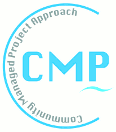CMP approach
The poor sustainability of rural water services is well recognized. Project-based, one-off and stand-alone implementation of water systems should be replaced with sustainable, large-scale approaches that actualize the philosophy of decentralized service delivery. One such an approach is the Community Managed Project (CMP) approach which has been piloted and successfully implemented in two regions of Ethiopia: within the Rural Water Supply and Environmental Programme in Amhara Region (RWSEP) and the Rural Water Supply, Sanitation and Hygiene Programme in Benishangul-Gumuz Region (FinnWASH-BG). Based on the promising results, the Government of Ethiopia has now decided to mainstream the CMP approach into its National WaSH strategy.
In RWSEP, the CMP approach has led up to a five-fold increase in the construction rate of new water schemes in the Amhara region. (From an average of 200 water points per year (1994-2003) increasing steadily, from 2003, to over 1000 water points per year in 2008/9.) Monitoring and evaluation data from the project show that at the same time the implementation costs per water point have been cut in half. Moreover, functionality rates for CMP schemes (94%) for Amhara are above average (estimated at 75%).
In the WaSH Implementation Framework (WIF) the CMP is being mainstreamed into the National WaSH Program (WaSH GTP/UAP) for its wider application. The major features of the CMP approach are:
- Fund Transfer: The unique and innovative feature of the CMP approach is that funds for the physical construction of water schemes are transferred directly to the community through a micro finance institution (MFI). The more detailed finance flow is depicted in the figure below.
- Community Project Management: The communities, through water and sanitation committees (WASHCOs), are responsible for the full development process through planning, financial management, implementation and maintenance. The communities contribute a minimum of 15% in cash or in kind. The unique and innovative feature in CMP is that the WASHCO manages not only community-generated funds but also the government subsidy provided for capital expenditures.
- Procurement: A further aspect of community management is that the WASHCO is directly responsible for procuring the goods and services required for water scheme construction and installation.
The CMP mechanism is intended mainly for low level technologies such as hand dug wells and spring protections and therefore the hydrogeological conditions need to be taken into account. However, water schemes with more demanding technology have also been implemented with the same approach in FinnWaSH-BG. Communities are provided with training and when needed, support is given during scheme implementation.

